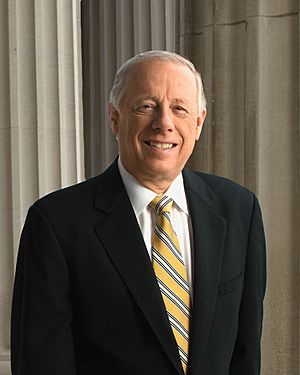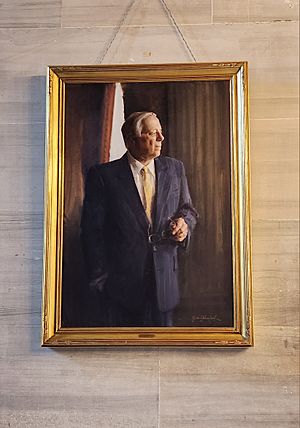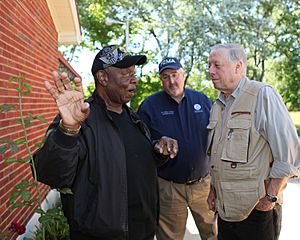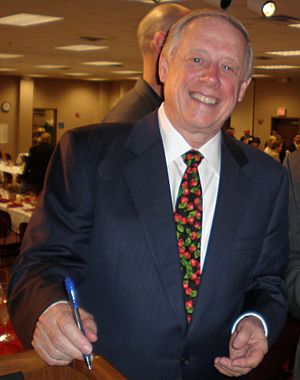Phil Bredesen facts for kids
Quick facts for kids
Phil Bredesen
|
|
|---|---|

Official portrait, 2008
|
|
| 48th Governor of Tennessee | |
| In office January 18, 2003 – January 15, 2011 |
|
| Lieutenant |
|
| Preceded by | Don Sundquist |
| Succeeded by | Bill Haslam |
| 4th Mayor of Metropolitan Nashville | |
| In office September 27, 1991 – September 24, 1999 |
|
| Preceded by | Bill Boner |
| Succeeded by | Bill Purcell |
| Personal details | |
| Born |
Philip Norman Bredesen Jr.
November 21, 1943 Oceanport, New Jersey, U.S. |
| Political party | Democratic |
| Spouses |
Susan Cleaves
(m. 1968; div. 1974)Andrea Conte
(m. 1974) |
| Children | 1 |
| Education | Harvard University (BA) |
| Signature | |
Philip Norman Bredesen Jr. (born November 21, 1943) is an American politician and businessman. He served as the 48th governor of Tennessee from 2003 to 2011. Before that, he was the Mayor of Nashville from 1991 to 1999. Bredesen is a member of the Democratic Party. He also started a company called HealthAmerica Corporation.
After leaving the governor's office in 2011, he became the chairman of Silicon Ranch Corporation. This company builds and runs solar power stations. In 2017, Bredesen decided to run for a seat in the United States Senate. He won the Democratic primary in 2018 but lost the main election. After that, he helped start Clearloop, a company focused on renewable energy.
People often describe Bredesen as a moderate Democrat. This means he often supports ideas from both sides of politics. He is known for being careful with money (fiscally conservative) but open-minded on social issues (socially liberal).
Contents
Early Life and Career
Phil Bredesen was born in Oceanport, New Jersey. His mother worked as a bank teller, and his grandmother, who sewed for a living, lived with them. He grew up in Shortsville, New York.
He earned a scholarship to Harvard University and studied physics. After college, he worked for a company called Itek. In 1971, Bredesen joined a pharmaceutical company, G.D. Searle & Company. He moved to London in 1973 to manage one of their divisions. In 1975, he moved to Nashville, Tennessee, where he started his own insurance company, HealthAmerica Corp. He later sold his share in the company.
Political Journey
Mayor of Nashville
In 1987, Bredesen ran for mayor of Nashville but did not win that time. He ran again in 1991 and was elected mayor.
As mayor, Bredesen focused on improving the city. He hired more than 440 new teachers and built or renovated many schools. He also helped bring professional sports teams to Nashville, like the NFL's Houston Oilers (now Tennessee Titans) and the NHL's Nashville Predators. New places like Nissan Stadium and Bridgestone Arena were built during his time. He also improved the city's library system and created new parks.
Bredesen served two terms as mayor and did not run for a third term in 1999.
Governor of Tennessee

Bredesen first ran for governor of Tennessee in 1994 but was not elected. He ran again in 2002 and won the election. He promised to manage the state government better and improve schools. He also aimed to fix TennCare, the state's healthcare program, which was facing financial problems.
First Term as Governor
When Bredesen became governor, Tennessee was facing a big budget problem. A large part of this was due to TennCare costing more than expected. Bredesen made changes to TennCare to reduce its costs, which saved a lot of money. He used some of these savings to help health clinics.
During his first term, Bredesen also worked to improve education. The state started the Tennessee Lottery to help fund college scholarships for high school graduates. Teachers' pay was increased, and a program to provide free books for children, like Dolly Parton's Imagination Library, was expanded statewide.
To bring more jobs to Tennessee, Bredesen worked to make it easier for companies to expand or move to the state. Many companies, including Nissan and International Paper, expanded or moved to Tennessee, creating many new jobs.
..... In 2005, he helped create a fund to protect important natural and historical lands in the state.
In 2006, Bredesen ran for re-election and won by a large number of votes, winning in all 95 counties.
Second Term as Governor

During his second term, the Great Recession began, which limited what Bredesen could do. He called for state spending cuts and offered a voluntary buyout program for state employees to reduce the workforce without layoffs.
He also signed laws related to gun rights. In 2009, he signed a bill that removed thumbprint requirements for gun purchases. He also signed a bill allowing loaded guns in cars. However, he vetoed a bill that would have allowed people to carry guns in bars, but the legislature voted to override his veto.
After Being Governor
Since leaving the governor's office in 2011, Bredesen has been involved in solar energy. He is the chairman of a company that develops solar power plants.
Many people thought Bredesen might run for president in 2008, but he said he was not interested. He did support Barack Obama for president in 2008.
2018 U.S. Senate Campaign
In 2017, Senator Bob Corker announced he would not run for re-election. Phil Bredesen then announced he would run for Corker's open seat in the United States Senate. He won the Democratic primary election in August 2018.
During the campaign, Senator Corker said that Bredesen was a "very good mayor, a very good governor, a very good business person." However, Corker still supported the Republican candidate, Marsha Blackburn. President Donald Trump also supported Blackburn and criticized Bredesen during the campaign.
Bredesen ran as a moderate candidate. He said he was against Trump's tariff policy, which he believed would hurt Tennessee's economy and jobs.
In October 2018, singer Taylor Swift publicly supported Bredesen. This was notable because she had not been openly political before. She encouraged people to register to vote.
Marsha Blackburn defeated Bredesen in the November 2018 election. The race was close for a while, but Blackburn pulled ahead after the confirmation hearings for Justice Brett Kavanaugh. Bredesen lost by about ten points.
Political Views
Phil Bredesen is often described as a moderate Democrat. This means his political views are often in the middle, not too far left or right. He is known for being careful with money (fiscally conservative) but having more open social views (socially liberal).
Regarding healthcare, Bredesen has said the Affordable Care Act "needs fixing." He supported a state constitutional amendment to ban gay marriage in 2006. However, he also supported the right of same-sex couples to adopt children. He supports protections against discrimination for same-sex couples. Bredesen also supports capital punishment.
Bredesen has supported the Second Amendment and is a gun owner. He has called for universal background checks for gun purchases and tighter checks for mental illness. He also supports banning "bump stocks," which make guns fire faster. As governor, he vetoed bills that would have allowed guns in bars.
On immigration, Bredesen has held views that are sometimes associated with both major parties. He supported ending the practice of giving state driver's licenses to undocumented people. However, he also supports DACA for young immigrants who were brought to the U.S. as children.
In October 2018, Bredesen supported the confirmation of Justice Brett Kavanaugh to the Supreme Court.
On money matters, Bredesen tends to be conservative. As governor, he opposed a state income tax and cut spending on the state's health care plan. He also supported increasing taxes on cigarettes. He supports increasing the minimum wage.
Personal Life
Phil Bredesen married Susan Cleaves in 1968, and they divorced in 1974. Later that year, he married Andrea Conte. They have one son, Ben. Bredesen identifies his faith as Presbyterian.
He is a founding member of a nonprofit organization called Nashville's Table. He also served on the board of the Frist Center, an art museum.
Images for kids
See also
 In Spanish: Phil Bredesen para niños
In Spanish: Phil Bredesen para niños
 | James B. Knighten |
 | Azellia White |
 | Willa Brown |



